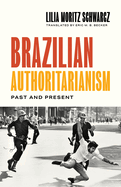
"Never has the present so closely resembled the past" in Brazil, according to anthropologist and historian Lilia Moritz Schwarcz's provocative study, Brazilian Authoritarianism: Past and Present. Schwarcz wrote the book--originally published in 2019 in Portuguese--"in the heat of the moment" after the November 2018 presidential election that brought far-right candidate Jair Bolsonaro to power. Appearing now for the first time in English, thanks to translator Eric M.B. Becker, the book presents Schwarcz's (The Emperor's Beard) main premise--that "a country's present is entirely impregnated by its past." Brazil's was shaped by its violent history as a Portuguese colony, Schwarcz writes, with slavery at the heart of it. It was within the "plantation model" of the powerful landowners that the "hierarchies of command and subordination became ingrained."
Citing a current trend of "historical revisionism... that seeks to return to a nostalgic and authoritarian version of a Brazil that never existed," Schwarcz explores more than 500 years of Brazilian culture and history to identify eight elements that continue to plague this young democracy: racism, bossism, patrimonialism, corruption, social inequality, violence, gender issues and intolerance. Brazil became a democracy in 1988, but the strong grip of political and social models, both authoritarian, threatens to negate the liberal strides made. Schwarcz ultimately calls for better education and a "more inclusive and egalitarian national political vision" as the antidote to the political, economic, social and cultural crises the country finds itself in today. Brazilian Authoritarianism is a robustly researched and elegant argument for a more promising future. --Peggy Kurkowski, book reviewer and copywriter in Denver

